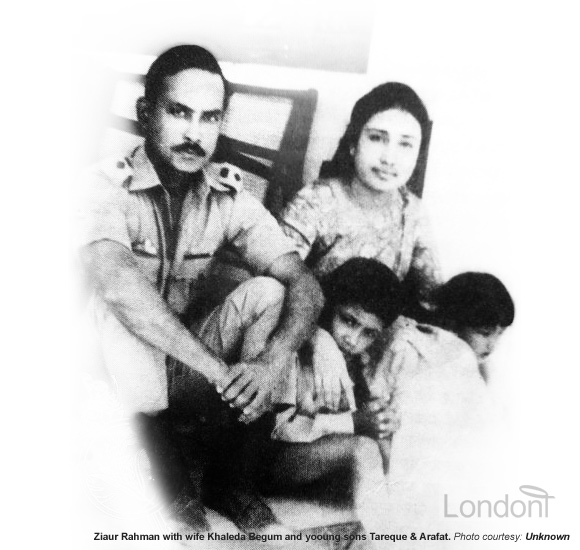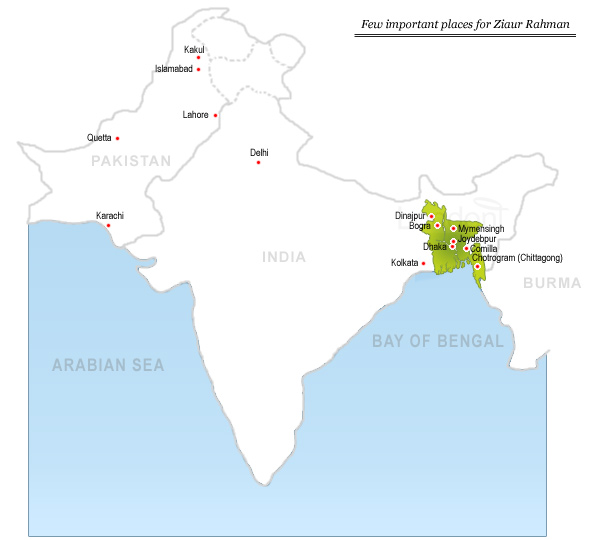
Family
Last updated: 10 October 2017 From the section Ziaur Rahman
Marriage to Khaleda Majumder
In August 1960, his marriage was arranged to Khaleda Majumder 'Putul', the 15-year-old third daughter of Iskandar Majumder and Taiyaba Majumder from the Dinajpur District, in a simple ceremony. Ziaur Rahman, a Captain in the then Pakistani Army who was posted at that time as an Officer of the Defence Forces, was 24 years old when he married young Khaleda, who was 9 years younger than him. His father, Mansur Rahman could not attend the marriage ceremony, as he was in Karachi. Zia's mother had died earlier. The wedding reception took place after one year in the then Hotel Shahbag, which later became the PG Hospital (now Bangabandhu Sheikh Mujib Medical University).
Ziaur Rahman was attracted by the charm and grace of this young girl and proposed to marry her.
After marriage, Khaleda Zia remained with her parents in East Pakistan to complete her studies and joined her husband in Karachi in 1963.
 Begum Khaleda Zia ()
Begum Khaleda Zia ()  Tarique 'Pino' Rahman (aka Tarek Zia) ()
Tarique 'Pino' Rahman (aka Tarek Zia) ()  Arafat Rahman ()
Arafat Rahman ()

Role model for aspiring Bengali army officers
Decorated hero after Indo-Pak War of 1965
Ayub Khan's highly successful military rule from 1958 to 1968 further convinced Zia of the need for a fundamental change in the Bengali attitude towards the military. During that period Zia offered a role model for Bengali youth, excelling in his army career.
During the Indo-Pakistani War of 1965, Ziaur Rahman made his mark as a valiant fighter whilst serving in the Khemkaran sector in Punjab as the commander of a company unit of 300–500 soldiers. The sector was the scene of the most intense battles between the rival armies. Zia's unit won one of the highest numbers of gallantry awards for heroic performances. Ziaur Rahman himself won the distinguished and prestigious Hilal-e-Jurat (Crescent of Courage) medal, Pakistan’s second highest military award, and his unit won 2 Sitara-e-Jurat (Star of Courage) medals, the third highest military award, and 9 Tamgha-e-Jurat (Medal of Courage) medals, fourth highest award, from the Army for their brave roles in the 1965 War with India.
 Ayub Khan ()
Ayub Khan ()  Hilal-e-Jur'at ()
Hilal-e-Jur'at ()  Sitara-e-Jurat ()
Sitara-e-Jurat ()  Tamgha-e-Jurat ()
Tamgha-e-Jurat ()
In 1966, Zia was appointed military instructor at the Pakistan Military Academy, later going on to attend the prestigious Command and Staff College in Quetta, Pakistan, where he completed a course in command and tactical warfare. Advocating that the Pakistan Army make greater efforts to recruit and encourage Bengali military officers, Zia helped raise two Bengali battalions called the 8th and 9th Bengals during his stint as instructor.
Around the same time, his wife Khaleda Zia, now 23, gave birth to their first child Tarique Rahman (more popularly known as Tareq Zia, in reminiscent of his father's main name) on 20 November 1967. Very soon Ziaur Rahman, the father, would have to combine his new found paternal instinct with his military expertise for a long suffering deprived nation hungry for justice.
Trained for high-ranking command posts, Zia joined the 2nd East Bengal Regiment (EBR) as its second-in-command at Joydebpur in Gazipur district, near Dhaka, in 1969. Although sectarian tensions between East and West Pakistan were intensifying, Zia travelled to West Germany to receive advanced military and command training with the German Army and later on spent few months with the British Army.

Turmoil in East Pakistan brings Zia to Chittagong
Zia returned to Pakistan the following year, and witnessed political turmoil and regional division. East Pakistan had been devastated by the 1970 Bhola cyclone, and the population had been embittered by the slow response of the central government. The political conflict between Sheikh Mujibur Rahman's Awami League, which had won a majority in the 1970 elections, the President Yahya Khan and West Pakistani politician Zulfikar Ali Bhutto had brought sectarian tensions to a climax. Sheikh Mujib laid claim to form a government, but Yahya Khan postponed the convening of the legislature under pressure from West Pakistani politicians. Bengali civil and military officers had alleged institutional discrimination through the 1960s, and now distrust had divided the Pakistani Army.
 Sheikh Mujibur Rahman ()
Sheikh Mujibur Rahman ()  Yahya Khan ()
Yahya Khan ()  Zulfikar Ali Bhutto ()
Zulfikar Ali Bhutto ()
Upon his return, Zia attained the rank of Major and was transferred in October 1970 to the 8th East Bengal regiment stationed in Chittagong to serve as its second-in-command.
